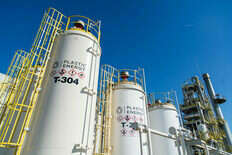
Emission Savings
Plastic Energy's latest Life Cycle Assessment (LCA) reveals that their chemical recycling technology can achieve up to 89% CO2 emission savings compared to incineration with energy recovery. This figure is attainable with grid decarbonisation, while current savings stand at 78%.
Study Details
The LCA study was conducted by climate change consultancy Sphera and commissioned by Plastic Energy. It evaluates emissions throughout the lifecycle of hard-to-recycle plastics, comparing different scenarios, including the use of Plastic Energy's technology.
Recycling Process
Plastic Energy's TAC™ recycling process transforms end-of-life post-consumer flexible plastic packaging into a recycled oil called TACOIL™. This oil serves as a substitute for fossil oils in the production of new plastics, offering a dual benefit of waste reduction and raw material production.

